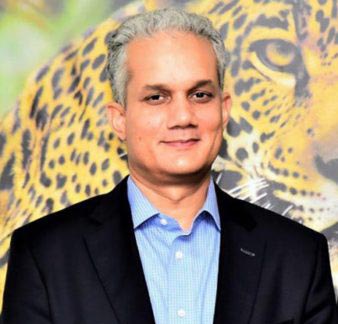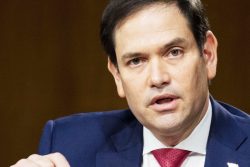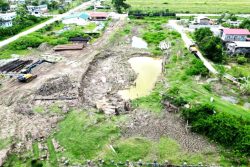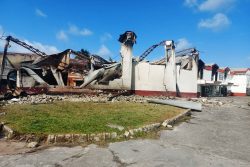Dr Jan Mangal, former petroleum advisor to President David Granger, has said he advised government against investing in the development of the now shelved onshore oil and gas supply facility at Crab Island, in Region Six, as the proposal did not go through the due diligence needed for the investment, which would have required billions of taxpayers’ dollars.
“There were many other issues on which I believe I advised the President so as to protect the interests of the poor people of Guyana (e.g. inappropriateness of using taxpayers’ dollars to develop Crab Island, need for a comprehensive and independent study of the natural gas opportunity considering impacts of sea-level rise and long-term national development, etc.,),” Mangal wrote in a letter to the Stabroek News, which was published on Thursday.
“…I advised against the use of about USD 500 Million of Guyanese taxpayers’ money on the Crab Island project in 2017 because there was no evidence that an independent, transparent and auditable decision-making process was used for selecting this particular project. There was no stakeholder engagement in the decision-making process. The industry standard feasibility studies were not performed to consider all locations along Guyana’s coast and there was no national development plan nor any tie in to such a plan. There was no consideration of the impacts of sea-level rise. For example, why spend USD 500 Million in a coastal swamp which could be submerged in decades,” Mangal explained
“Crab Island and the surrounding area was likely to be virgin mangrove, with important flora and fauna. Mangrove plays a critical role as a natural sea defense. The project chart suggested that the Government intended to destroy this natural coastal area and replace it with an industrial zone. It is doubtful there was any Environmental Impact Assessment, nor stakeholder engagement,” he added.
He is of the firm view that it was not acceptable for government ministers to decide how to spend such a huge amount of taxpayer’s money in “an opaque and seemingly arbitrary way.”
In late December, 2016, Natural Resources Minister Raphael Trotman, who then held responsibility for the oil and gas sector, announced that government had planned to invest in an onshore oil and gas facility at Crab Island. He said that when completed, it would see an overall investment of some US$500 million and the creation of 600 jobs.
Trotman had even revealed that Cabinet had given its ‘no objection’ to the establishment of the onshore industrial site in the area and that it would be forged through the joint efforts of the Natural Resources, Public Infrastructure and Business ministries. Construction, according to Trotman, was expected to start early 2017.
“It is a multiyear project. The idea is to identify potential investors and the government is looking for a public-private partnership arrangement where we in government would have a minority stake but would try to open it up to world class companies who know about this but also to give Guyanese companies [an opportunity] to be a part of it as well,” Trotman had told Stabroek News, when asked for an update in March of 2017.
“…We have received proposals from some world-class companies and some local companies. So the idea is to see how we can marry those together so that we can have a major company that is well versed in the supply and logistics business but ensuring that there are some Guyanese in there as well,” he added.
Trotman ruled out ExxonMobil as government’s major partner for the project, while saying that the company would be looking to procure the services needed. “What we have to do is to provide that service, so they use that service… that is the way it is being done all over the world,” he said.
He added that he and Minister of Public Infrastructure David Patterson had travelled to New Orleans, in the US, to have a firsthand look at similar operations there. “At no time does the company itself invest in the facility; the company uses the facility,” he added.
Asked if he was given any assurances by ExxonMobil that it would use facilities set up by government, he said “Oh yes.”
Trotman stressed that the decision to develop Crab Island and put a deep water port there was not done on a whim as government had looked at studies conducted under the People’s Progressive Party/Civic-led government by Trinidadian and Indian companies. “Crab Island has the best comparative advantage over Georgetown… the fact that there is available land, we don’t have to go and uproot anything, the fact that you have, of course, economies of Regions Five and Six that will benefit immensely and the entire nation. So it has a lot of advantages that we believe are good,” he added.
The Ministry of Natural Resources would months later say that the Crab Island project was not definite and studies had to be done.
“Where the proposed on-shore base is concerned, it must be stated that though the Ministry of Natural Resources has identified Crab Island, Berbice as a very possible site, the necessary feasibility and environmental and social impact studies have not been completed and for this reason there is no sanctioned project,” then ministry spokesman Johann Earle later wrote in a letter to this newspaper.
“The exact location has not yet been settled and arrangements are being made to formally approach an international institution to conduct the necessary studies to answer the questions of what type of on-shore base Guyana will need, where it should best be located and how the corporate and financial structures should be configured,” he added.
‘Main influence’
Mangal was asked if he believes that his advice to the President resulted in the project being shelved and he said, “I can’t tell you if it was as a result of my advice.”
He said that he had also expressed concerns about CGX having a part in the development of the area given its links to the previous administration. “I was also worried that CGX was involved with this in some way because CGX has an opaque relationship with the past government in Guyana,” he noted.
But he underscored that the “main influence” in his decision making was because he did not find the process to be transparent and in keeping with the principles that should govern government spending. “The main reason… was because they did not follow any acceptable process. There was no due diligence or no decision making process to show,” he said.
Responding to potential critics of his advice, Mangal said that more than anyone he wants this country to benefit tangibly from the proceeds of oil and gas. He said that if he comes across as being negative, it is just him trying to hold government accountable.
“Although I may come across as being negative about oil and negative about elements in the current government, let me stress the following: Firstly, I believe in the oil industry but it will only work in our favour if we pursue it in a particular way. Secondly, I believe Guyana is very lucky to have President Granger in place at this critical phase. The country would be worse off with respect to O&G if the behaviours exhibited under the previous government were being exhibited now. Although there are numerous rotten apples in the current government, the President is a stabilising force. But I worry he is the only one who has grasped the magnitude of the opportunity before Guyana, and grasped the challenges/risks. I worry about his recent illness because the O&G situation would quickly deteriorate if President Granger is no longer at the helm. Some of those around him are, frankly, dangerous to Guyana, as were elements in the previous government,” he said.










